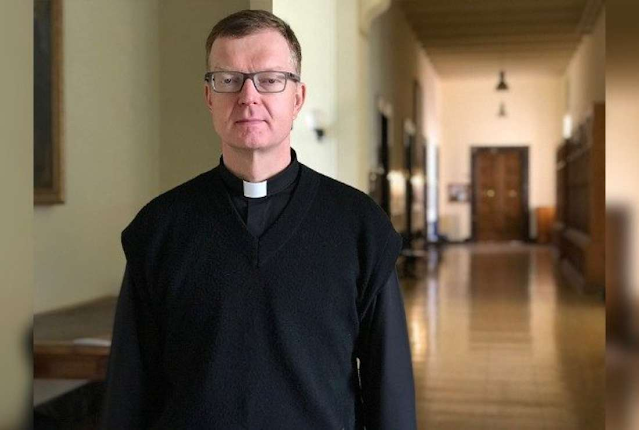After over a decade of Francis governance. Now top Jesuit expert says Church is exemplary in abuse prevention but weak in dealing with it
Zollner: Church is exemplary in abuse prevention, but weak in dealing with it
Vatican expert at a lecture in Vienna: As the “largest and most efficient child protection organisation in the world,” the Church must do everything it can to become (Cathcon: again!) a “safe place.”
The Catholic Church worldwide has gone through a huge learning process in recent decades regarding protection against violence and abuse, but has lost this progress by failing to deal with past crimes: This is what Jesuit and child protection expert Hans Zollner said on Wednesday presented at a lecture in Vienna organized by the Klasnic Commission. In contrast, Zollner viewed the church's actions in Austria as a positive example of coming to terms with the situation. According to the theologian and psychologist, the credibility of the church's message as a whole depends not least on how cases of violence and abuse are dealt with.
Despite all the ongoing failings, he considers the church to be the "largest and most efficient child protection organization in the world," said Zollner, who has been working on the issue of church abuse at the Pontifical Gregorian University since 2012 and also heads a scientific center for safeguarding there. "No institution, no state, no NGO and no religion or denomination has invested as much in guidelines, mandatory training and education as the Church does for its staff across the board, right down to the youth leaders and voluntary ministers of the Eucharist, those who prepare children for First Communion and confirmation sponsors," emphasized the expert who trains bishops' conferences and church employees around the world on prevention issues.
The situation is completely different when it comes to dealing with abuse that has occurred, even though it often dates back decades. "A single case, poor communication or the inability to react publicly to crises and scandals destroys thousands of hours of prevention work. This demotivates and demoralizes those working in this area, but in particular leads to the credibility of the church as a whole suffering," he said Zollner. What he considers even worse than the loss of reputation and trust of the church as an institution or of the priests is "that our message will no longer reach the believers," as abuse is diametrically opposed to the principles and image of God in Christianity.
According to Zollner's many years of experience in advising bishops' conferences around the world, the process of coming to terms with the problem in the church almost always comes too late. Instead of addressing the issue "in time before it explodes" - for example through measures, training staff and striving for justice for those affected - the local churches around the world waited and hoped that the issue would pass them by. But that is not the case anywhere, "everyone is caught up in the abuse, and when the scandal breaks out, everyone is paralyzed, has no courage and no prospects and gets into arguments with each other," said the Jesuit.
Zollner praised the path taken by the Church in Austria in 2010 as “exemplary”. With the Independent Victim Protection Attorney ("Klasnic Commission"), the Diocesan Ombudsman offices and commissions, a structure has been created to offer those affected by abuse a point of contact and a voice and to recognize their suffering. Zollner emphasized that, in contrast to most other countries, it had been possible to fully integrate religious communities in addition to the Dioceses.
However, it is a “dangerous illusion” to assume that the abuse in its many variations has come to an end. Despite all prevention, the danger remains present, in the Church and in other social contexts. Vulnerable groups - in addition to children and young people, the sick, the disabled, residents of nursing homes or people on the run - are particularly affected by this, for which there is still a lack of awareness.
“Safeguarding” as a goal
For the further treatment of the issue of abuse in the church, Zollner strongly advocated the term "safeguarding", which is the one best meeting the task at hand. More than just concepts against abuse, it is about “creating good” through a basic attitude characterised by vigilance, respect and transparency. "We have to give people security through relationships, spaces and processes that they can rely on. People in certain positions have to do their job." What is important is not just the existence of guidelines and standards but also their implementation, with Zollner also describing the introduction of control and monitoring mechanisms in the Church as a “job for many years to come”.
Above all, it is important not to see safeguarding as the exclusive task of bishops or specialists tasked with this, but as an "integral part of all church activities", from pastoral care and education to administration, emphasised Zollner, who spoke of a "prophetic task" here. "Safeguarding is part of the mission of the church and all those who belong to it. Until we understand this and develop a different kind of church with respect for the dignity of each individual, our systemic deficiency will remain." The voice of those affected also needs to be heard and new low-threshold, spiritual offers and forms of support need to be developed for "people who are wounded". Zollner believes that religious communities have a role to play here.
Cathcon: Responsibility for this lies with Francis who covers up for the abuse of his friends and cronies.










.jpeg)

Comments